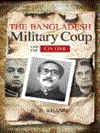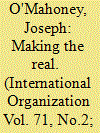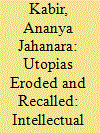| Srl | Item |
| 1 |
ID:
179458


|
|
|
| 2 |
ID:
169652


|
|
|
| 3 |
ID:
131020


|
|
|
|
|
| Publication |
New Delhi, Rupa Publications India Pvt Ltd, 2014.
|
| Description |
xvii, 401p.Hbk
|
| Standard Number |
9788129129086
|
|
|
|
|
|
|
|
|
|
|
|
Copies: C:1/I:0,R:0,Q:0
Circulation
| Accession# | Call# | Current Location | Status | Policy | Location |
| 057752 | 355.0095492/KHA 057752 | Main | On Shelf | General | |
|
|
|
|
| 4 |
ID:
153605


|
|
|
|
|
| Summary/Abstract |
Do normative arguments change what political actors do and if so, how? Rather than using the pure force of abstract moral reasoning, states often try to move the locus of contestation to an arena where they can make practical progress—the evidence or the empirical facts in support of their argument. This paper analyzes how states try to bolster their position first by constructing an argument in which an action represents part of their argument and then by performing that action to make the argument seem more convincing. I call this mechanism rhetorical adduction. The paper challenges theories of communication that deny a causal role to the content of normative arguments and diverges from a leading view on argumentation that arguments have their effects through persuasion. Integrating strategic argumentation theory with theory from psychology about how people make choices based on compelling reasons rather than cost-benefit analysis, I also use theory from sociology on how people resolve morally complex situations through the performance of “reality tests.” I illustrate the mechanism using a case from the Indo-Pakistani war of 1971 when initial resistance to recognizing the putative state of Bangladesh after India's invasion of East Pakistan was reversed as a result of an argument that Indian troop withdrawal meant that international norms were not violated.
|
|
|
|
|
|
|
|
|
|
|
|
|
|
|
|
| 5 |
ID:
163822


|
|
|
|
|
| Summary/Abstract |
The short-lived geopolitical entity, East Pakistan (1947–71), left a deep impact on its successor state, Bangladesh, through the networks of intellectual kinship it enabled for its young elites who subsequently became Bangladesh’s nation-builders. Drawing on memory studies and literary critical reading methods, I examine the testimonies of nine such elites interviewed by the ‘Bengali Intellectuals Oral History Project’ (BIOHP), alongside their writings published before and after the creation of Bangladesh. This first sustained account of East Pakistan’s intellectual legacy thus also illustrates how a post-colonial intellectual history may be extracted from oral histories as the private and inchoate domain of memory.
|
|
|
|
|
|
|
|
|
|
|
|
|
|
|
|